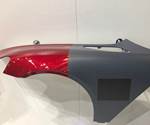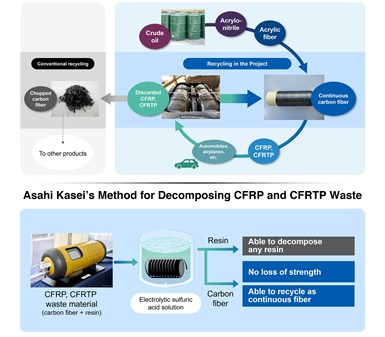Asahi Kasei collaborates on continuous carbon fiber reclamation development
Inexpensive, closed-loop recycling system employs electrolyzed sulfuric acid to cleanly separate the fiber from the resin.
Asahi Kasei (Tokyo, Japan), a diversified multinational company, together with partners at the National Institute of Technology, Kitakyushu College (Kyushu) and Tokyo University of Science, has developed a new technology for recycling carbon fiber-reinforced plastic (CFRP) and carbon fiber-reinforced thermoplastics (CFRTP) used in automotive applications.
Some technologies for recycling carbon fibers by chopping and reapplying them often results in low-quality, less-durable products that are insufficient for high-performance applications. Asahi Kasei’s recycling method, however, involves electrolyzed sulfuric acid solution, which is reported to properly maintain the continuous carbon fiber’s original strength while fully decomposing the resin it was embedded in. Ultimately, the continuous fibers can be inexpensively extracted at a vehicle’s end of life (EOL) and repurposed. (See Vartega and DEECOM for similar results with continuous carbon fiber reclamation.)
In addition, Asahi Kasei is developing a CFRTP unidirectional (UD) tape that uses recycled continuous carbon fiber and the company’s Leona polyamide
resin. Boasting a higher strength than metal, the company says the CFRTP-UD tape can be applied to automotive frames and bodies, further enabling the recycling of EOL vehicle parts.
Moving forward, Asahi Kasei says it will perform demonstrations and develop the business, aiming for practical application around 2030.
Related Content
-
Combining multifunctional thermoplastic composites, additive manufacturing for next-gen airframe structures
The DOMMINIO project combines AFP with 3D printed gyroid cores, embedded SHM sensors and smart materials for induction-driven disassembly of parts at end of life.
-
Manufacturing the MFFD thermoplastic composite fuselage
Demonstrator’s upper, lower shells and assembly prove materials and new processes for lighter, cheaper and more sustainable high-rate future aircraft.
-
Developing repairs for thermoplastic composite aerostructures
HyPatchRepair project proves feasibility of automated process chain for welded thermoplastic composite patch repairs.













